Phil Ivey Granted UK Supreme Court Appeal in Crockfords Edge-Sorting Case
Hold that light switch for a second; the party’s not quite over. Famed high-stakes gambler and poker pro, Phil Ivey, has been granted the right to appeal to the United Kingdom’s Supreme Court the previous rulings against him in his lawsuit against London’s Crockfords Casino. Ivey continues to legally wrest £7.8 million in disputed punto banco winnings that Crockfords refused to pay following a multi-day visit in 2012.
 Ivey’s UK counsel, including Richard Spearman QC of Thirty Nine Essex Chambers, Max Mallin QC of Wilberforce Chambers, and Matthew Dowd of Archerfield Partners LLP, had vowed to seek the UK Supreme Court ruling immediately after a three-judge High Court appellate panel upheld the initial case ruling last November.
Ivey’s UK counsel, including Richard Spearman QC of Thirty Nine Essex Chambers, Max Mallin QC of Wilberforce Chambers, and Matthew Dowd of Archerfield Partners LLP, had vowed to seek the UK Supreme Court ruling immediately after a three-judge High Court appellate panel upheld the initial case ruling last November.
Dowd, who appears to be Ivey’s lead attorney in the case, told British outlets, “Phil and his legal team are delighted that the Supreme Court judges have decided that the Court of Appeal’s decision should be reviewed. The Court of Appeal’s ruling left the interpretation of Section 42 of the Gambling Act totally unclear and the decision to grant permission to appeal demonstrates that the Supreme Court agrees with that view.”
“The Supreme Court is the UK’s highest court of appeal for civil cases and only hears cases which raise issues of general public importance,” said another Ivey representative upon the announcement that the appeal would be granted.
There’s an element of truth in “issues of general public importance,” if one overlooks the fact that most gamblers aren’t ever involved in £7.8 million gambling cases. However, an even larger factor is the novelty of the case and the unique grey area of gambling law that the ongoing battle between Ivey and Crockfords continues to explore. Similar unexplored nuances dot the somewhat parallel case involving Ivey in the United States, where he continues the legal battle against New Jersey’s Borgata casino. To date, Ivey has come out the financial loser in all rulings issued on both sides of the Atlantic, but the granting of the UK Supreme Court appeal might stir thin hopes of an Ivey appeal — if that eventuality arises — to the US version in the Borgata case as well.
“Last November’s Court of Appeal ruling made no sense to me,” said Ivey about the UK case, in a prepared statement. “The original trial judge ruled that I was not dishonest and none of the three Appeal Court judges disagreed, and yet the decision went against me by a majority of 2 to 1. I am so pleased that the Supreme Court has granted me permission to fight for what I genuinely believe is the right thing to do in my circumstances, and for the entire gaming industry. I look forward to the Supreme Court reversing the decision against me.”
Unfortunately, the core of the UK ruling was not based on “honesty”, but that the behavior of Ivey and his gambling partner, “Kelly” Sun, violated the rules of punto banco (mini-baccarat) being a game of pure chance through the implementation of their complex scheme.
As Lady Justice Mary Arden wrote in the majority appellate decision favoring Crockfords:
The crucial factor in this case is that Punto Banco is a game of pure chance [case citation]. What Mr Ivey caused Crockfords’ staff to do was to take steps which would alter the chance of his winning materially by some 8% in his favour. In my judgment, because of his plan to play using the knowledge obtained from the reorienting of the cards under his direction, those matters amounted to interference with the process by which the game was conventionally played. It was quite different from card-counting which involves memorising where particular cards are.
The schedule of the appeal has yet to be determined.




















COMMENTS